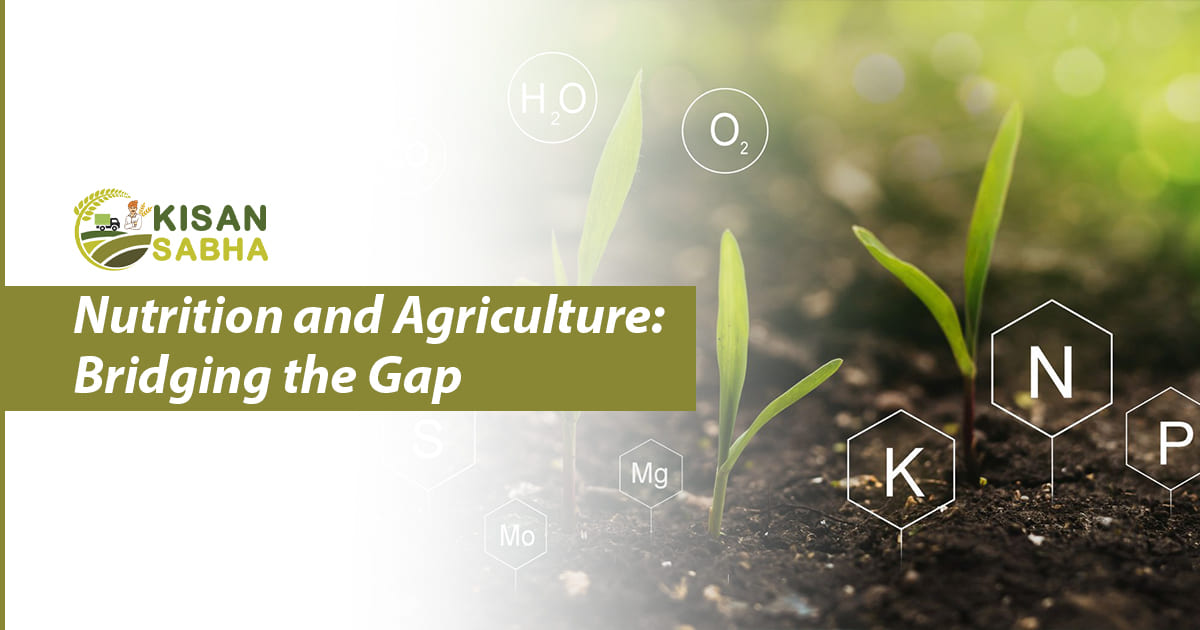Nutrition and agriculture are two interconnected fields that are vital in ensuring food security and public health. However, there is often a gap between agricultural practices and their impact on nutrition. In this article, we will explore the relationship between nutrition and agriculture, highlighting the importance of bridging this gap. We will delve into the challenges faced, the potential solutions, and the benefits of integrating nutrition-sensitive approaches into agricultural systems. We can work towards a sustainable and nutritious food system by understanding the crucial link between nutrition and agriculture. It will not only support the well-being of individuals but also the communities.
The Nutrition Challenges in Agriculture
- Micronutrient Deficiencies:- While agriculture focuses primarily on the production of staple crops, it often overlooks the importance of diverse and nutrient-rich foods. This leads to insufficient intake of essential vitamins and minerals, resulting in micronutrient deficiencies, such as iron, vitamin A, and zinc.
- Imbalanced Diets:- Traditional farming practices may prioritize the production of calorie-dense crops, neglecting the need for a balanced diet that includes fruits, vegetables, and animal-sourced foods. This can contribute to imbalanced diets and malnutrition, both undernutrition and overnutrition.
- Food Loss and Waste:- Inefficient post-harvest handling and storage practices contribute to significant food loss and waste. This affects food availability and exacerbates nutritional challenges by reducing access to nutritious foods.
Nutrition-Sensitive Agriculture
To bridge the gap between nutrition and agriculture, it is essential to adopt nutrition-sensitive approaches that consider the nutritional value of crops and promote diverse and balanced diets. Here are some key strategies:
- Crop Diversification:- Encouraging farmers to diversify their crop production can help improve diets. This includes promoting the cultivation of fruits, vegetables, legumes, and other crops that provide essential vitamins, minerals, and dietary fiber.
- Biofortification:- Biofortification involves breeding crops to enhance their nutritional content, particularly in terms of micronutrients. Therefore, this approach can help address micronutrient deficiencies by producing crops with higher levels of essential vitamins and minerals.
- Sustainable Livestock Production:- Integrating livestock into agricultural systems can contribute to improved nutrition. Livestock farming provides a source of animal-sourced foods, such as meat, milk, and eggs, which are rich in essential nutrients like protein, vitamins, and minerals.
Also Read:- What are the Challenges of Smallholder Farmers and Their Impact?
Enhancing Agricultural Practices for Nutrition
To ensure that agriculture promotes nutrition, it is crucial to adopt sustainable and inclusive practices. Here are some strategies:
- Sustainable Farming Techniques:- Implementing sustainable farming techniques, such as organic farming, agroecology, and permaculture, can enhance soil fertility, biodiversity, and crop quality. These practices promote the production of nutrient-rich foods while minimizing the use of synthetic inputs.
- Efficient Water Management:- Proper water management in agriculture is crucial for crop growth and nutrient absorption. Implementing efficient irrigation systems and water conservation practices helps ensure that crops receive adequate water while minimizing water wastage.
- Post-Harvest Management:- Improving post-harvest management practices can reduce food loss and waste. Hence, it includes proper storage, packaging, processing, and transportation techniques to maintain the nutritional quality of harvested crops.
Strengthening Policies and Collaboration
To bridge the gap between nutrition and agriculture effectively, it is essential to strengthen policies and foster collaboration among various stakeholders. Key considerations include:
- Policy Integration:- Governments need to integrate nutrition-sensitive approaches into agricultural policies and programs. This involves considering nutrition outcomes in agricultural planning, investment, and research.
- Multi-Sectoral Collaboration:- Collaboration between the agriculture, health, and nutrition sectors is crucial. For addressing the complex challenges at the intersection of nutrition and agriculture collaboration is a must. This includes engaging with farmers, researchers, policymakers, civil society, and other stakeholders to develop holistic solutions.
- Knowledge Sharing and Education:- Promoting awareness and knowledge about the link between nutrition and agriculture is vital. This includes educating farmers, consumers, and policymakers about the benefits of diverse diets, sustainable farming practices, and the importance of nutrition-sensitive agriculture.
Conclusion
Bridging the gap between nutrition and agriculture is essential for building a sustainable and resilient food system. By incorporating nutrition-sensitive approaches, such as crop diversification, biofortification, sustainable livestock production, and efficient water management, we can improve diets, reduce malnutrition, and enhance overall public health. However, strengthening policies, fostering collaboration, and promoting knowledge sharing are crucial steps to ensure the successful integration of nutrition and agriculture. By working together, we can create a food system that not only meets the nutritional needs of individuals but also supports the well-being of communities and the planet.



